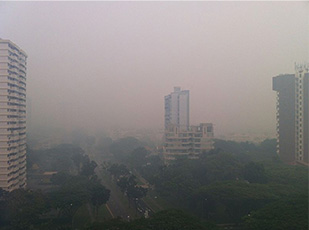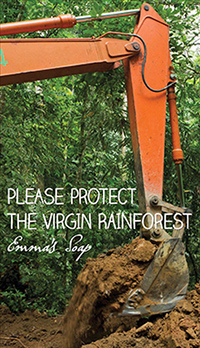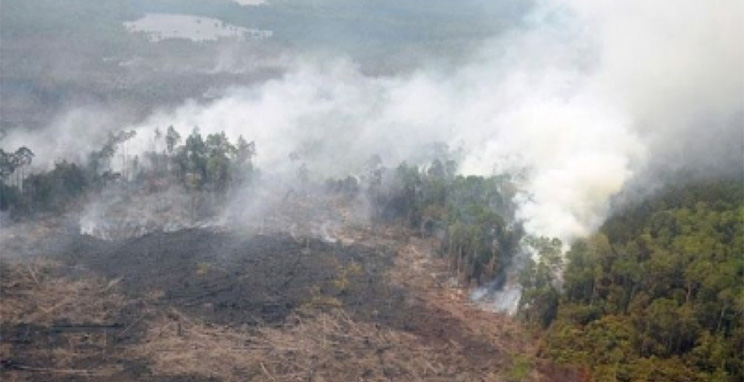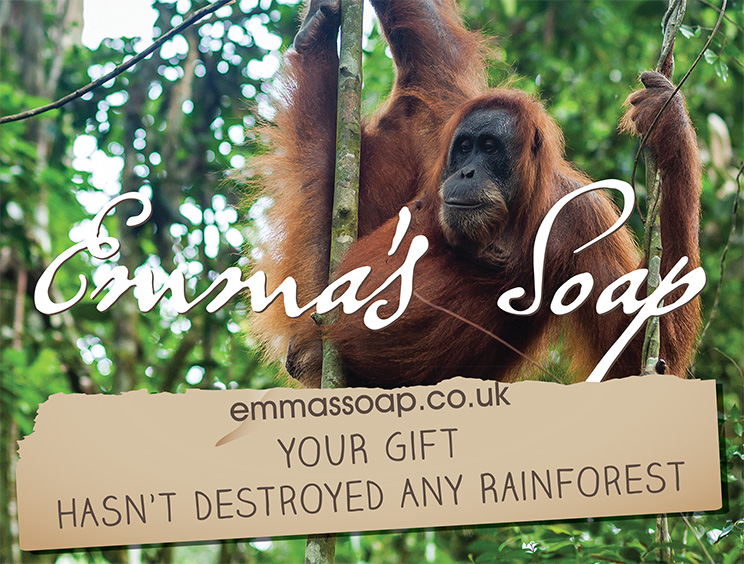SAY NO TO PALM OIL
It's In Everything - Cosmetics, Food, Engine Lubricants
Controversial Crop
One of the inspirations behind my soap were the ingredients, the quality and the properties of the oils and butters as well as the ecological impact on growing and harvesting those oils. Palm Oil is not on the list of Emma's ingredients - Sodium Palmate.
What's so good about Palm Oil?
It's a valuable economic crop, with 1.5 million (estimated) small farmers growing it in Indonesia. Due to the potential for a high income growing the crop, it has replaced traditional practises. Cash economy, fuelled by plan oil, has resulted in improving infrastructure, with better access to schools and health facilities. Palm oil is the most profitable use of land in the tropics; it's income contributes to economic growth and the alleviation of rural poverty.
Unrefined palm oil contains 50% saturated, 40% monounsaturated, 10% polyunsaturated fats, a variety of nutrients including Vitamin A, E and antioxidants. It can be used to treat vitamin A deficiency and help hydrate famine.
Negative side to Palm Oil
Land Taken
Reports up until 2012 show land has been taken without consultation or compensation from indigenous people, in places such as Papua New Guinea, Colombia, Indonesia, Malaysian, Sate Sabah and on the island of Borneo, and Sarawak, which has led directly to conflict. Palm Oil companies have even been reported to use force to acquire the land.
Greenhouse Emmission
The plantations are instead of virgin rainforest, home to thousands of animals now endangered and many on the brink of extinction. Cutting down the forest and clearing the land emits enormous, damaging and irrevocable carbon emissions into the atmosphere, accounting for 10% of manmade CO2 emissions.
Water Pollution
The good news is Palm Oil plantations need little pesticides or fertilisers once the plant has established, only nitrogen, phosphorus and potassium are regularly applied to palm fruit trees, however this produces sediment and harmful substances which are exiting via streams run through the plantations and ultimately end up in the fresh water ways.
Also for every metric tonne of Palm Oil produced, 2.5 metric tonnes of liquid waste is also produced. This sludge was disposed of through the river systems.

Human Rights
Following investigations by Amnesty International there are reports that the adult workers have high targets, which need to be meet to earn a days pay, either work until the target is achieved or take a pay cut, many children as young as 8 work after school (some have given up on school) to help their parents keep their jobs. Some women were earning as little as $2.50 per day. Subjecting adults and their children to long hours, heavy lifting, a hazardous environment without safety equipment and exposure to chemicals. These reports come from RSPO plantations, which supply supposedly Sustainable Palm Oil.
Critically endangered in Sumatra due to habit loss
2007 survey of numbers that remain in the wild:
The Sumatran Tigers, rare subspecies that only inhabits Sumatra - 400 left
Sumatran Elephant, smallest of the Asian elephants - 2,800 left (2016 as few as 1300)
Orangutans - 7,300 (recently surveyed with barely 6300 left)
The numbers are deceasing with no prospect of recovery.
2019 The Sumatran Rhino, the smallest rhino species, hairy with two horns, was declared extinct.

Sustainable Palm Oil - or is it?
Whilst I applaud the movement to establish sustainable Palm Oil, my research has led me to the opinion that there is still much work to be done to make this credible and provide a transparent Material Identity Scheme (MIC). Set up in 2004 to establish clear, ethical, and ecological standards for producing palm oil, the roundtable on Sustainable Palm Oil (RSPO) — currently the largest sustainability-focused organisation within the palm oil sector. However its standards do not ban deforestation or destruction of peat lands for the development of palm oil plantations. Plantations need to meet the criteria of being well-managed with good environmental, social and economic standards. RSPO set a date! All plantations pre-2005 were included.

Certified Sustainable Palm Oil (CSPO) comes from plantations that were established on land cleared before 2005!
New plantations are allowed to remove forest as long as the land is not deemed "high-value conservation forest." Each member country can interpret "high value" based on its unique situation, basically subject to personal opinion. Furthermore, supply chain model is used for CSPO. 'Mass Balance' is also allowed which is the mixing of certified and noncertified palm oil in a controlled environment, ensuring that the volume of certified palm outputs never exceed the certified inputs!
For me it is contrived, I don't want to nit-pick: I merely ask the question "Why do we need to use Palm Oil in everything?' I agree with the many arguments of established plantations, after all, it can store more carbon than any other vegetable crop. However, do we need to add to the demand and continue the deforestation, habitat degradation, climate change, animal cruelty and indigenous rights abuses?

Facts about Lash & Burn, forest fires and the smog caused
In 2015 the Indonesian government declared a state of emergency due to the smog from 'Lash and Burn' a method of clearing vegetation for Palm Oil. These forest fires, an illegal practice often spread out of control and into protected forest areas. The fires can produce a dense smog effecting the population over hundreds of kilometres away, as far as Thailand and the Philippines. More than 28 million people in Indonesia were effected and 140,000 reported respiratory illnesses, such as respiratory infection, pneumonia, skin irritation, eye irritation.
Schools were closed for days effecting 4 million students in Indonesia, Malaysia and Singapore. It was reported that the pollution cost South East Asia $47 billion US dollars.
In 2016 Indonesian government made 454 arrests in connection with forest fires, Sago - plantation company - was fined $81 million US dollars. The fires caused smog do bad it led once again to school closures as well as air and sea traffic disruptions. Once again the country went into a state of emergency, with reports of 100,000 deaths caused from respiratory illnesses.
The peat fires are the most difficult to put out, burning underground springing up in other places months later.

The Problem
The Biggest Palm oil plantations are in Indonesia, stretching across 6 million hectors (size of Belgium) with plans (as of 2015) to add a further 4 million hectares, the largest producer of palm oil yielding 33.5 million tonnes in 2014! With 96% being produced on Borneo and Sumatra.
The entire production is derived from Indonesian rainforest, which ranked third in the world next to the Amazon and Congo basins.
The destruction of the rainforest involves removing the native forest, burning invaluable timber and the remaining forest undergrowth, damaging peatland, and producing far more emissions that biofuels can remove. The fires alone emit immense quantities of smoke into the atmosphere which makes Indonesia the third highest greenhouse gas emitter in the world. Such deforestation not only harms the environment but is a serious threat to already endangered species, human rights abuse too. Child labour also debit bondage where a person pledges labour or services as a security for repayment of debt or other obligation - debt slavery can be passed on from generation to generation.
A Conservation Emergency
The Indonesian Island of Sumatra holds (what little is left) some of the richest and most diverse tropical rainforests, home to 59 mammal species, 6 species of primates and 192 bird species. Sumatra is the only place in the world where tigers, rhinos, orangutang and elephants coexist.
